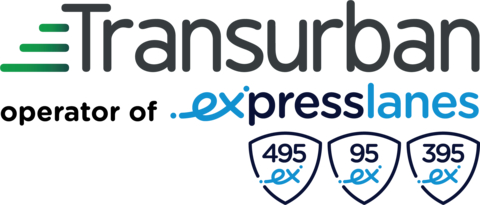Transurban and Partners Demonstrate the Future of Safer Travel with Connected Autonomous Vehicles on Virginia Express Lanes
Transurban and Partners Demonstrate the Future of Safer Travel with Connected Autonomous Vehicles on Virginia Express Lanes
ARLINGTON, Va.--(BUSINESS WIRE)--On October 11-13, 2023, Transurban North America along with partners from the Virginia Department of Transportation (VDOT), the Virginia Tech Transportation Institute (VTTI) and Crash Avoidance Metrics Partners, LLC (CAMP LLC) conducted demonstrations for connected autonomous vehicles (CAVs) on Transurban’s 395 Express Lanes just outside of the nation’s capital. The trials and demonstrations were funded in part by a $7.5 million grant from the US Department of Transportation (USDOT) to support CAV research, also known as automated driving systems (ADS).
For more than ten years, Transurban—operator of the 495, 95, and 395 Express Lanes—has been partnering with the Commonwealth of Virginia to bring faster and more reliable travel to the Washington, DC region. As a pioneer in transportation innovation, Transurban goes beyond concrete and steel solutions through a first-of-its-kind dynamic pricing structure, operation of the longest reversible road in the United States, and now forging the way with collaborations spanning the public safety and consumer technology sectors.
“The future of how we get from point A to point B is changing every day. Transurban and our partners know we must continually innovate to keep travelers safer as technology enables the next generation of transportation,” said Mike Discenza, Acting President, Transurban North America. “Transurban’s proprietary, embedded technologies and closed environment on the 395 Express Lanes enable the perfect testing ground for infrastructure that talks to vehicles and vice versa—making roads safer as travel turns autonomous.”
The coalition partnered with law enforcement and first responders to identify situations in which CAVs need to respond quickly and appropriately, such as the presence of first responders, work zones or traffic incidents on the road. While CAVs are currently able to navigate their immediate area, the demonstrations are meant to demonstrate how technology integrated into infrastructure like the smart Express Lanes can make CAVs safer, more reliable, and more efficient as the industry prepares for the next generation of road travel.
“What we are proving here is the capability of smart infrastructure to communicate with smart vehicles and first responders—making travel safer and faster,” said Japjeev Kohli, Vice President of Technology, Transurban North America. “Smart roads, like Transurban’s Express Lanes, are leading the way in integrated infrastructure technology—and we are just getting started. These demonstrations are only the beginning of making every road a smart road as future cars become smarter cars.”
With a focus on safety, the demonstrations put a CAV through its paces in a series of scenarios meant to challenge the vehicle and ensure its performance keeps everyone safe—both inside and outside the vehicle. Scenarios included:
- A law enforcement officer providing hand signal around a simulated crash scene
- Detecting upcoming hazards out of the line of sight of the CAV through communication with the roadway technology
- Navigating safely around first responders and construction workers and work zones
- Forming a tight vehicle formation based on real-time speed and distance information from infrastructure increasing road density
A second round of demonstrations will be conducted on the 395 Express Lanes in November.
Since 2017, Transurban’s global CAV testing program has worked with governments and industries to assess how roadside and vehicle technologies interact. The trials and demonstrations on the 395 Express Lanes mark the twelfth such study, following previous research on fully and partially autonomous vehicles and driverless heavy trucking. A new partnership with Silicon Valley’s Plus was launched earlier this year to further autonomous trucking research in Australia.
About Transurban North America
Transurban is one of the world's largest toll-road operators and developers, working to get people where they want to go, as quickly and safely as possible. In fiscal year 2023, our faster, more reliable roads saved customers an average of 413,000 hours each workday across five global markets. In the Commonwealth of Virginia, our public-private partnerships are transforming transportation choices using dynamic, real-time pricing on the 495, 95, and 395 Express Lanes. As we celebrate a decade of keeping Virginia travelers moving, we continue to work alongside our government partners to drive the technology, policy and mobility solutions that are connecting and strengthening communities today and ten years from now.
Contacts
Tanya Sheres, Director of Corporate Affairs and Marketing, Transurban North America
tsheres@transurban.com, (571) 335-3511
